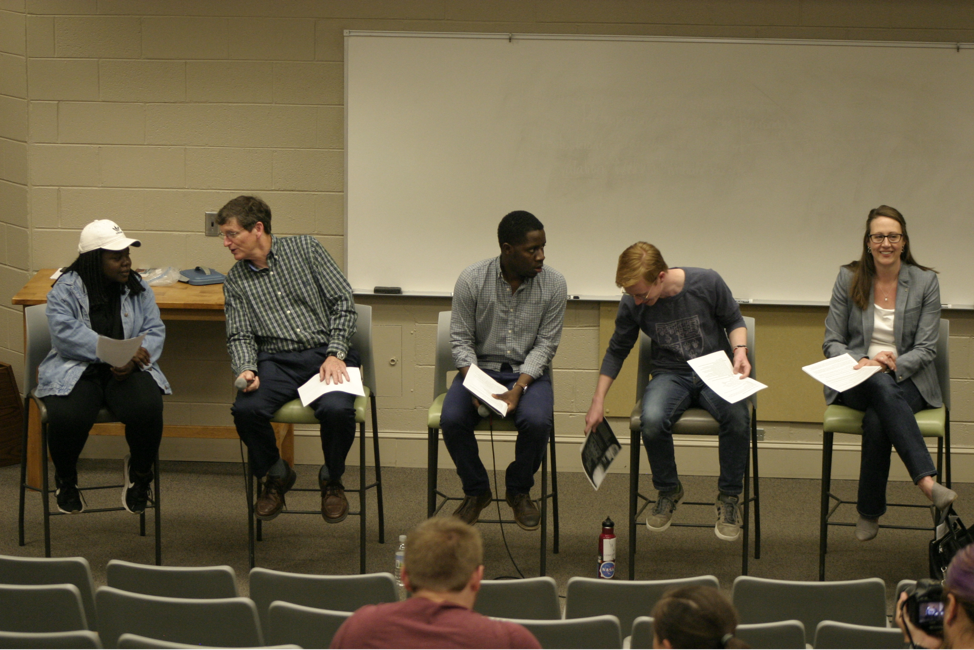The Apostolos Missions Club set up a panel in Hyder auditorium to discuss short-term missions on April 10. The panel featured speakers from the Milligan community with experience in missions settings. Campus Minister, Brad Wallace opened the discussion. The panelists were asked about their relationship to Milligan and their involvement in mission work.
The panelists included:
Professor of Political Science, Dr. Amy Edmonds, who grew up in Venezuela where her parents worked as missionaries;
Patrick Lines, a Milligan Student who lived in Kenya for ten years where his parents were missionaries;
Pai Mushayamunda, a masters student at Milligan and a board member at Good Samaritan Ministries in Johnson City;
Associate Dean of the School of Bible and Ministry, Phil Kenneson;
Emmah Ndune, a Milligan nursing major, from Zimbabwe, whose parents were pastors in Kenya.
The panel discussed short term missions with a focus on difficulties short term missions can create when pursued improperly. “We all want to be heroes,” Edmonds said. “But that’s not always what Christian leaders need.” Edmonds stressed the importance of mission work that fosters growth in communities, rather than work that removes individual problems.
Lines also stressed the importance of not merely solving a small problem and leaving but urged the importance of working for long term missionaries stationed before and after the short term missionary’s time in the field. Concurring with Lines, Mushayamunda said that the particular long term missionary ought to be a local from the community. Elaborating on this point, Ndune explained the importance of local long-term missionaries, as locals work with better understandings of the culture they serve and already know how to best channel the efforts of the short term missionary.
The panelists stressed that American Christians should strive to learn from communities that they do mission work in. Pai Mushayamunda remarked that the American Christians should seek to learn from churches in foreign countries, noting that while Christianity is spreading rapidly in Asia and Africa, it is diminishing in the United States.
Lines described his frustration with short term missionaries who return boasting “special knowledge” from their mission work. Lines stressed that Christians should do their mission work humbly.
The panel discussed some of the ineffective forms of short term mission work they have witnessed. Ndune shared that she had seen a short term missions group once visit a community, develop a mistranslation of the Bible, and then leave. “You can’t do that,” said Ndune.
Edmonds remarked on ineffective strategies for evangelism often used by short term missionaries, especially the strategy of door evangelism.
“For what it’s worth, it does not work very well,” said Edmonds. Edmonds explained that in her experience, door to door evangelism could quickly produce hundreds of names of people interested in connecting with a local church, of which only a few would actually come to visit the next Sunday. Kenneson said that charity to Kenya, in the form of used clothing donations, has destroyed Kenya’s textile industry.
Lines added that food shortages can inspire people to donate food and likewise damage a community’s agriculture, perhaps even undoing the work long-term missions organizations have invested in fostering a community’s independence.
Mushayamunda brought the issue of power dynamics in missions to the discussion, explaining that American missionaries hold an inevitable posture of power when entering the mission field.
Ndune said that such power dynamics can create bad relationships with communities.
Kennesson said, “We often forget that when you’re the giver, you have power.”
After taking a ten minute break, cards were collected from students in the audience, which Wallace used to convey some of their questions to the panelists.
Mushayamunda remarked that while there are often many flaws with short term mission work, such missions still have a lot of potential.
When asked how Christians interested in doing short-term mission work could find good ministries, Lines recommended looking for organizations that are present and involved in the communities they are serving. Lines also recommended that prospective short-term missionaries check for any connections an organization may have with Milligan College.
The panel was asked the panel if churches capitalize on foreign nations’ poverty. “‘Yes’ is the answer,” said Edmonds. Edmonds recommended prospective short-term missionaries not just travel abroad to do mission work to gratify themselves. To this point, Mushayamunda warned against merely going to have amazing experiences. Mushayamunda said that he sometimes refuses to give advice to prospective short-term missionaries for this reason.
Wallace asked the panel to discuss the relevance of the Great Commission to short term missions. Kennesson shared his expertise concerning the original Greek, “The imperative command in the Greek is make disciples”. Kennesson shared a quote from Mother Theressa who would turn down volunteers saying “Go find your own Calcutta”. “If you can’t do it here, don’t think you’ll magically be able to do it there.” said Kenneson.

